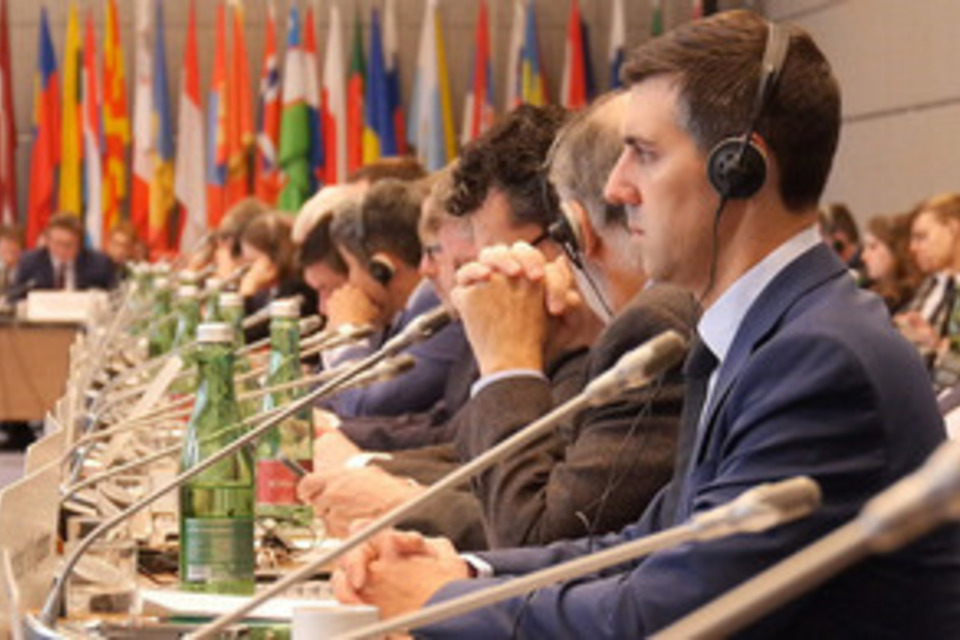Annual progress report on the OSCE gender action plan: UK statement
Ambassador Neil Bush thanks Secretary General Helga Schmid for presenting the Annual Progress Report on the Implementation of the OSCE 2004 Gender Action Plan.

Thank you Secretary General for presenting the Annual Progress Report today. As you mentioned, the last year has indeed been difficult. It’s also shown how quickly hard won progress on gender equality can come undone.
In this respect, we welcome the efforts that the OSCE Executive Structures have taken to ensure that gender equality remained high on the OSCE’s agenda, including through webinars, conferences, staff training and practical assistance to participating States. We also thank Albania for their focus as Chair on gender equality in 2020, as well as Sweden for their efforts this year.
Whilst your Report highlights some progress on gender mainstreaming, we are concerned by the slight regression in mainstreaming gender in programmatic activities in the politico-military dimension, as well as the limited nature of this in the second dimension. However, we appreciate that gender balance in panels has improved and this is an important step and visible signal of commitment. This has also been an integral part of the UK’s approach to Security Committee meetings, and it helps to improve the quality and inclusivity of our discussions.
I will focus on three areas in your Report – the impact of the pandemic on gender equality; the OSCE’s working culture, including a zero tolerance approach to sexual exploitation, abuse and harassment; and the importance of fully implementing the Women Peace Security agenda, including in conflict mediation processes.
Firstly – the backsliding that we’ve seen on gender equality during COVID-19 is a cause for great concern. It is incumbent on all of us to address this, and to build back better and more inclusively from the pandemic. We know that women have been disproportionately affected as frontline workers in the fight against COVID-19, globally accounting for around 70% of health workers, and placing themselves at increased risk of contracting COVID.
At the same time, we saw a shocking surge in domestic violence during periods of lockdown, with women being the majority of victims. We commend the OSCE for their rapid response to help address domestic violence, including through the provision of practical assistance to victims, with at least 8,000 women benefiting. It is essential that we take an inclusive lens to gender equality. Intersecting factors, such as disability, can substantially increase the likelihood of experiencing gender-based violence. We encourage a greater focus on intersecting factors in the coming year.
Secondly – we welcome your focus on ethics and ensuring a positive and inclusive working culture at the OSCE. It is the responsibility of all organisations to put in place appropriate, effective internal governance systems and processes. These must protect staff from bullying and harassment, including sexual harassment, and prevent sexual exploitation and abuse. The consequences of failing to do so are grave, both for the victims and for the reputation of the organisation.
We are very supportive of the Secretary General and the Secretariat’s endeavours in this regard. It is the responsibility of us as participating States to assist these efforts and to ensure that necessary resources are in place to support the OSCE’s zero tolerance approach to any such incident. We look forward to seeing this reflected in the next Unified Budget, and to the updated Code of Conduct and Staff instruction 21 later in the year.
Thirdly – the OSCE has a key role to play in implementing the Women, Peace and Security agenda. We appreciate the ongoing work of the Executive Structures to support participating States in its implementation. We also recall the Joint Statement on UNSCR 1325 at Tirana, to which 52 participating States signed up, which includes potential actions for furthering the WPS agenda.
We encourage a strong focus on implementing these actions. We appreciate the ongoing work to ensure that a gender perspective is included in conflict mediation, and in the full, equal and meaningful participation of women in peace processes at all levels of decision-making. Your report specifically highlights an internal strategy for the Geneva International Discussions on inclusivity aspects. Such an approach is essential to the sustainability of peace. The OSCE’s toolkit: “Inclusion of Women and Effective Peace Processes” is a valuable resource for conflict mediation in all OSCE conflicts, and we continue to encourage full use of this tool.
In concluding, we would like to thank all those who have contributed to advancing gender equality at the OSCE. It is essential that gender is fully integrated into the organisation’s work. Your recommendations provide a helpful framework for achieving this. We look forward to building on the positive developments of this year, while preventing backsliding, and to ensuring that, as we emerge from the pandemic, we learn the lessons and build a more inclusive future in the OSCE region.